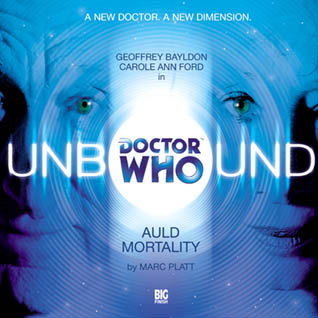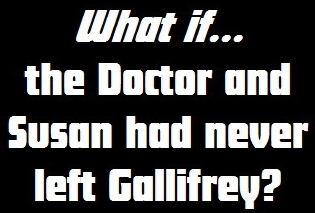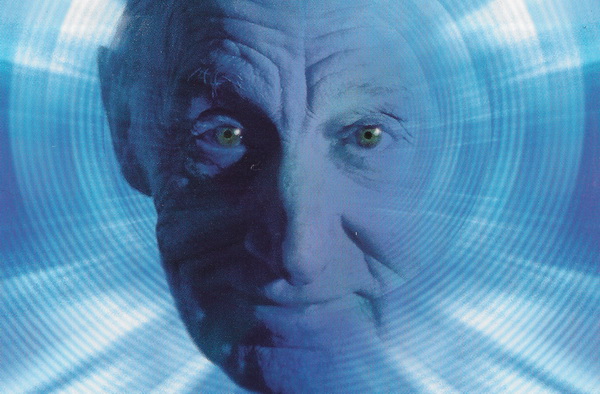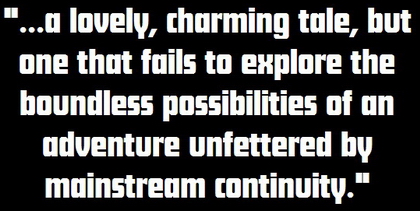|
| |
|
STORY PLACEMENT This story takes place PRIOR TO THE BIG FINISH AUDIO "A STORM OF ANGELS."
WRITTEN BY MARC PLATT
DIRECTED BY NICHOLAS BRIGGS
RECOMMENDED PURCHASE BIG FINISH 'UNBOUND' CD #1 (ISBN 1-84435- 012-6) RELEASED IN MAY 2003.
BLURB
In
a
mausoleum deep
beneath the
Capitol,
Gallifrey's
favourite
author
MUST face his
ultimate
destiny.
Who is the
woman
who claims
to be his
granddaughter?
Who is the
figure in
robes
of night?
Which
path should
Hannibal's
army
take to
Rome?
And on
a mountain
high
in the Alps, the
Doctor
remembers
the
question: What
if
he and Susan had
ever
left Gallifrey? |
|
|
Auld Mortality MAY 2003
Way back in 2003, Doctor Who was celebrating its 40th anniversary. What many fans remember most about that time was the long-awaited announcement that the series was soon to return to our television screens. However, 2003 still had plenty of Who to offer, not least of which was Big Finish’s Unbound series. The series was based on two simple ideas: to take Doctor Who in previously unexplored areas, by presenting ‘What if?’-styled stories that couldn’t be accommodated in the regular series, and to take the opportunity to cast new actors in the role of the Doctor.
Back then, Paul McGann had been the incumbent Doctor for seven years, and the next televised incarnation was still two years away. So, while BBCi brought us their own new Doctor in Scream of the Shalka, Big Finish brought us no fewer than five new Doctors. Now, with the festivities firmly behind us, and the series approaching its 45th anniversary, I thought I’d have a look back at this series, to see how it stands up now. I wondered how much I’d enjoy these plays without the original novelty of the new Doctors.
Mortality; a nice, spooky-sounding title that sets the tone quite well. Marc Platt asks the most obvious ‘what if?’ question of all: what if the Doctor had never left Gallifrey?
The choice of Doctor in this first production is Geoffrey Bayldon, best known to most as the wizard Catweazle, and to fans as astrologer Organon. Bayldon has revealed in interviews that he was approached to play the Doctor when the series first began, but declined on the ground that he was sick of ‘ageing up’ for roles. Now (on audio, where it wouldn’t matter) he’s older than Hartnell was back in the day. Bayldon makes a perfectly acceptable Doctor, if perhaps a little predictable. He seems to have been chosen mostly as a good likeness of Hartnell in voice. He certainly has a pleasant grandfatherly voice, but does sound a tad too old to be dashing about in some of the more energetic scenes. It isn’t actually specified how long he’s been on Gallifrey since he made the fateful decision to leave the TARDIS where it was, beyond “centuries”, and it seems likely that he’s still in his first incarnation. Whether he was supposed to be the first Doctor, or an alternative version, I’m not certain. Either way, it’s a fine performance, if an unremarkable one.
Better is Carole Ann Ford, returning as Susan, here specified as the Doctor’s daughter’s daughter, and with grandchildren of her own. Ford excels in her portrayal of an older, wiser Susan; a far cry from the whimpering kid of the original series, but still recognisable as the same character. She has matured into a strong-willed woman, and is in many ways a more impressive character than the Doctor.
Platt’s Gallifrey is here something of a mixture of his own from Lungbarrow and the televised version, complete with authentic staser effects. From the novel, we have the Doctor’s erstw-hile servant Badger (played with aplomb and sympathy by Toby Longworth) and his ‘uncle’, the sinister Ordinal-General Quences (also well-played by Derren Nesbitt). Nevertheless, the arcane houses and families are abandoned in favour of a more recognisable, human-styled family. When Susan comes to find her long-lost Grandfather, now Gallifrey’s most celebrated author, there’s a real sense of reunion.
The Doctor’s life as a solitary author is brought across well, giving a real sense of his herm-itude, speaking only with Quences and Badger and shunning the rest of Gallifreyan society. However, his tales of ‘the Adventurer’ aren’t works of imagination; the Doctor has created an illegal (and somewhat disquieting) ‘possibility generator’, a device that constructs its own realities. This gives us extended sequences in the Alps, with the Doctor experiencing safe adventures with Hannibal and his talking elephant Surus!
Doctor’s lifestyle. His existence is based on trying to set up a puppet President, and he’s been attempting to manoeuvre the Doctor into the position for centuries. When Susan arrives, though, another possibility presents itself - it turns out that she might be in line for the Presidency…
While the story is a good exploration of the Doctor’s unsatisfying life on Gallifrey, doomed to observe and never become involved, it fails to explore the wider implications of his decision to stay home. We don’t find out how the universe has coped in his absence, save for a brief reference to fungal coups on Esto, and the expansion of the “Thalek” Empire (something that I was dying to hear more about following the cries of “Annihilate!”) A missed opportunity.
The
story is resolved cleverly, and left surprisingly open-ended (although
this is undermined somewhat by the later sequel). Ass a series opener, this
one sets out Unbound’s mission statement well, and remains,
four years on, an enjoyable and an unusual tale.
|
|
|
Copyright © Daniel Tessier 2008
Daniel Tessier has asserted his right under the Copyright, Designs and Patents Act, 1988 to be identified as the author of this work. |
|
|
To say that it’s been around for almost fifty years now, I find it astonishing that there haven’t been more series like Doctor Who Unbound. Many of my friends are devotees of American comic books which seem to be riddled with restarts and reinventions every few years, and even science-fiction franchises the like of Star Trek and Star Wars boast ‘Mirror Universe’ and ‘Infinity’ spin-off ranges, exploiting a whole host of what ifs and never wases. But surely Doctor Who doesn’t need to explore alternate possibilities in order to keep things fresh? Doesn’t the show’s format takes care of that by itself? After all, who needs a parallel Doctor when you can have a next Doctor? And so when Big Finish Productions announced that they would be dipping a tentative toe into the multiverse to celebrate the series’ fortieth birthday, my curiosity was piqued. If Big Finish were going to bring us new Doctors from new dimensions, then they were going to have to be strikingly different from those that we knew already, otherwise the whole endeavour would be pointless.
The first Unbound release, Auld Mortality, was a project full of promise. Its writer, Marc Platt, had literally written the book on Gallifrey – in our universe, at least – and was thus the perfect candidate to tackle what might have happened had the Doctor and Susan never left Gallifrey. Carole Ann Ford was to return to the role of Susan for the first time since The Five Doctors twenty years earlier, and, better still, the actor cast in the role of the Doctor was none other than Geoffrey Bayldon, who notoriously turned down the opportunity to play both the first and second Doctors on television. Auld Mortality therefore had the potential to be a window into what might have been in more ways than one, probing parallels on the metafictional level as well as in the narrative. The reality, however, would be somewhat different.
paints in this story is subtly different to the one that we all know, the differences are not all that pronounced. Gallifrey may have lost its looms, but its inhabitants are largely the same. Lungbarrow’s Ordinal- General Quences and Badger are both present and correct, and are even presented as being exactly as one would find them in our reality; at least ostensibly. Fair dues, Quences is now the Doctor’s explicit “great grand uncle” (as opposed to implicit father) and Susan now his apparently biological granddaughter, but for me this conventional human family set-up only makes matters less interesting, not more. Worse still, particularly with Susan at his side, Bayldon is never truly afforded the opportunity to create his own Doctor – he is, quite literally, the first Doctor who went down a different path; a reclusive old man writing about adventures in time and space instead of living them. He even adopts William Hartnell’s cadences. This is a great shame, really, as I’ve no doubt that the man behind Catweazle and Worzel Gummidge’s Crowman could have brought something diverse to the table, if only he had the chance. As it stands, by the story’s end, Bayldon’s Doctor is little more than a Hartnell sound-alike who took a bit longer to half-inch a TARDIS.
Nevertheless, once I’d got past my initial disillusionment, I did find Auld Mortality to be an enchanting story. Platt’s “possibility generator” is inspired, particularly given the Unbound series’ remit, and it allows him to continually blend what is and what might be in the most arresting of ways. The production’s sound design is absolutely exquisite as it carries the listener from damp mausoleums on Gallifrey to snow-covered mountain tops on Earth and back again. The script is also littered with surreal elements that range from the disturbing to the hilarious – here we have talking elephants, ghosts in machines and “Thaleks”. Most importantly though, Platt makes sure that his story has a suitably commemorative feel, his exultant finale exploring the Doctor’s many possible futures (including a junkyard on a cold winter’s night redolent of An Unearthly Child, and the foggy night on Barnes Common told of in David Whitaker’s off-canon novelisation of The Daleks) and his Doctor even breaking the fourth wall as he wishes listeners a “Merry Othermass”, lampooning Hartnell’s infamous toast to the series’ yuletide viewers in The Feast of Steven.
On balance though, I get the feeling that Platt would have rather written
a straight prequel than a slightly-skewed one. Auld Morality is a
lovely, charming tale, but it’s one that fails to explore the boundless
possibilities of an adventure unfettered by mainstream continuity. I can’t
help but wonder how different this production might have been had Big
Finish stuck with their earliest plans and cast Anthony Stewart Head as
their first Unbound Doctor, or shown us a universe where Turlough
accepted the Black Guardian’s gift of Enlightenment. Who knows? Maybe
there’s a universe out there where they did.
|
|
|
Copyright © E.G. Wolverson 2010
E.G. Wolverson has asserted his right under the Copyright, Designs and Patents Act, 1988 to be identified as the author of this work. |
|
|
Unless otherwise stated, all images on this site are copyrighted to the BBC and are used solely for promotional purposes. ‘Doctor Who’ is copyright © by the BBC. No copyright infringement is intended. |
|

.jpg)

 The
first in the original series of six is Auld
The
first in the original series of six is Auld  Quences is far from happy with
the
Quences is far from happy with
the 
 Whilst
the universe that Platt
Whilst
the universe that Platt